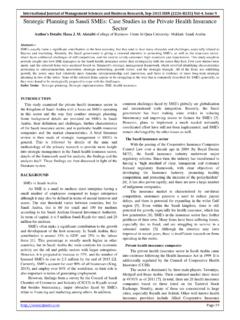Transcription of International Journal of Management Sciences and …
1 International Journal of Management Sciences and business research , Dec-2015 ISSN (2226-8235) Vol-4, Issue 12 Page 88 Comparative Study on MBA Programmes in Private & Public Universities - A case study of MBA programme plan of Srinivas University Author Details: Dr. P. S. Aithal-School of business Administration, Srinivas University, Mangalore - 575 001, INDIA Abstract The MBA (Master of business Administration) degree is perhaps the world's best known and most widely recognized post graduate degree. It is a professional degree - in that it prepares or further prepares individuals for responsible positions in business - usually managerial positions. Despite its venerable age (the first MBA degrees were awarded in the early twentieth century), MBA programmes remain both popular and relevant.
2 MBA programs are run throughout the world, as they are seen to be relevant for the preparation of people for work in Management irrespective of the industry, business sector, the nature of the economy, etc. Although critics of the programmes have been numerous, large companies and increasingly small ones as well continue to see real value in the MBA as the first stage in a professional career in Management . In this paper, the public and private universities are compared based on their ability to provide quality and innovative post graduate business Management education in terms of quality, latest innovative curriculum, specialisations, programme duration, foreign exposure, industry orientation, networking, placement service, total credits for the programme, course fee structure, and examination system.
3 Comparison is done by considering some of public and private universities and their ability to add values to the programme in the frame of stakeholder s reference. Finally, the advantages benefits, constraints and disadvantages of public and private universities are identified and are listed under organisational, students, faculty, parents and societal issues using focus group method. Keywords : Innovations in business education; MBA programme; Private university; Public university. I. INTRODUCTION Indian higher education is not only large in scope but complex in its working and evolution. One indicator is existence of four different types of universities depending on who funds them and regulates them. For example, Deemed to be Universities come under the purview of UGC and are mostly funded by private resources.
4 They were also in controversy for corruption and qualitative deficiencies for profiteering. This also tainted the name of some of the better quality private Deemed to be Universities. Given the regulatory and media attention to the deficiencies with Deemed to be Universities, Private Universities gained attraction. This is evident from their growth from 100 to 140 in less than a year as compared to no growth of Deemed to be Universities in the same period. The private universities are working hard to attract students away from central and state universities by offering differentiated courses incorporating features like triple mains, super-specializations, dual degrees, integrated programs, CBCS, and industry affiliated courses. It is tougher for self-financing colleges to rapidly implement such measures as they can move only at the speed of the affiliating state universities that often take ages to implement an innovation [1].
5 The best example is the Choice Based Credit System (CBCS), which the UGC has been coaxing all public universities to implement. Till now, there has been only very few takers for this global standard, whereas many leading private universities have already implemented it without any prompting, as a progressive measure. Private Universities have also turned aggressive on the faculty hiring front, with the latest trend being such institutions hiring from the corporate sector. Many senior managers working in the corporate sector are now switching to teaching roles in these private universities, as they offer more flexible working hours and less of deadlines and targets. The maximum switching has happened from the IT Sector, with professionals having necessary academic qualifications like or changing roles to become Assistant Professors or Professors at these universities.
6 The offered pay is also competitive - between 80,000 to lakh - even though it is still around 20% lower than in the corporate sector. The political aversion towards private universities too is ending in some states, with the most notable being Maharashtra. Despite pockets of resistance like Tamilnadu, Puducherry, & Kerala, private universities are here to stay. In Karnataka as on 01/06/2015, eleven private universities have started to function as per UGC status declaration in its website. This paper focuses on how a private university can plan its MBA programme so innovatively compared to public universities based on their intention and autonomy to innovate so that a distinct course is emerged out for next generation students by considering the MBA programme of a recently started private university - Srinivas University.
7 International Journal of Management Sciences and business research , Dec-2015 ISSN (2226-8235) Vol-4, Issue 12 Page 89 II. SUCCESS OF PRIVATE UNIVERSITIES It is predicted that Private Universities in India will overtake more elite and traditional universities in world rankings within a generation or two , like the incredible growth of private universities in developed countries. The traditional universities in India are lagging behind in rankings due to a lack of investment in research and the private sector provides the solution to getting the brains back into the country . Two generations ago, all the best schools were provided by the public sector - now it has flipped around and it is expected that same will happen in higher education within a generation or two [2-3]. Among the private universities in India, two universities are doing extremely well in business Management education.
8 They are Amity University, Noida and Alliance University, Bangalore. Amity University is owned by the non-profit foundation of the AKC Group of Companies, which operates petrochemical, technology and pharmaceutical firms, among others. It has provided higher education in India since 1995 (with university status since 2005) and has nine campuses in India, along with International campuses in London, Singapore, New York, California, Mauritius, Romania, Abu Dhabi, South Africa, China and Dubai. Similarly, Alliance University, Bangalore is a Private University established in Karnataka State during 2010. The university is successfully offering MBA programme with variety of specializations. The MBA programme of Alliance University is rated high compared to all public sector universities in the state.
9 III. MBA PROGRAM The MBA (Master of business Administration) degree is perhaps the world's best known and most widely recognized post graduate degree. It is a professional degree - in that it prepares or further prepares individuals for responsible positions in business - usually managerial positions. Despite its venerable age (the first MBA degrees were awarded in the early twentieth century), MBA programmes remain both popular and relevant. MBA programs are run throughout the world, as they are seen to be relevant for the preparation of people for work in Management irrespective of the industry, business sector, the nature of the economy, etc. Although critics of the programmes have been numerous, large companies and increasingly small ones as well continue to see real value in the MBA as the first stage in a professional career in Management .
10 Though they often have very similar curricula and aims, MBA programmes are certainly not homogeneous. Many programmes differ in terms of aims, philosophies and teaching/delivery methods. Even more importantly, though, MBA students are a very diverse bunch. Walking through the campus of any leading business school, one will encounter people from many different countries, backgrounds and professions. Gone are the days if they ever existed when the mere possession of an MBA degree was enough to secure for the degree holder a rosy future at the top level of a large corporation, complete with large salary and generous perks. Many MBA students, to be sure, do graduate into such jobs. Others don t. The initials MBA no longer have the pulling power they did thirty years ago.









